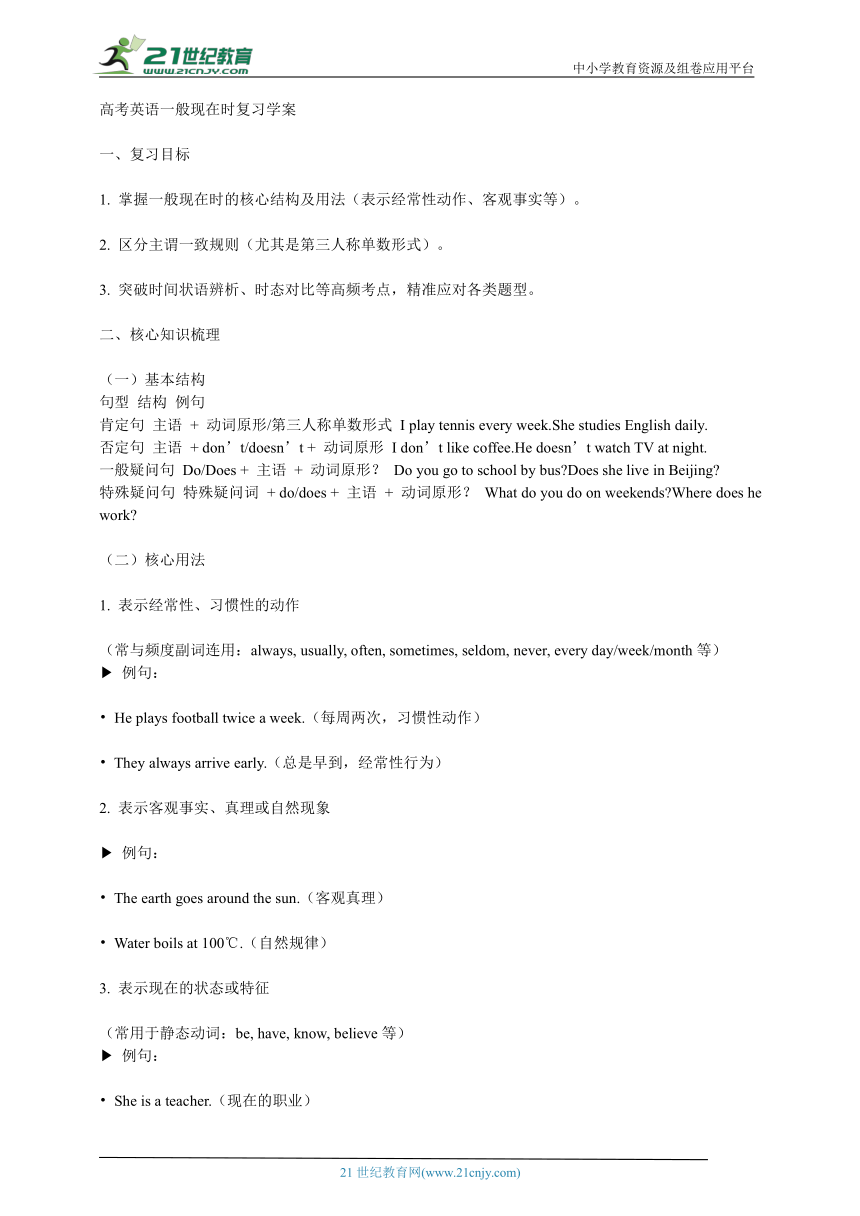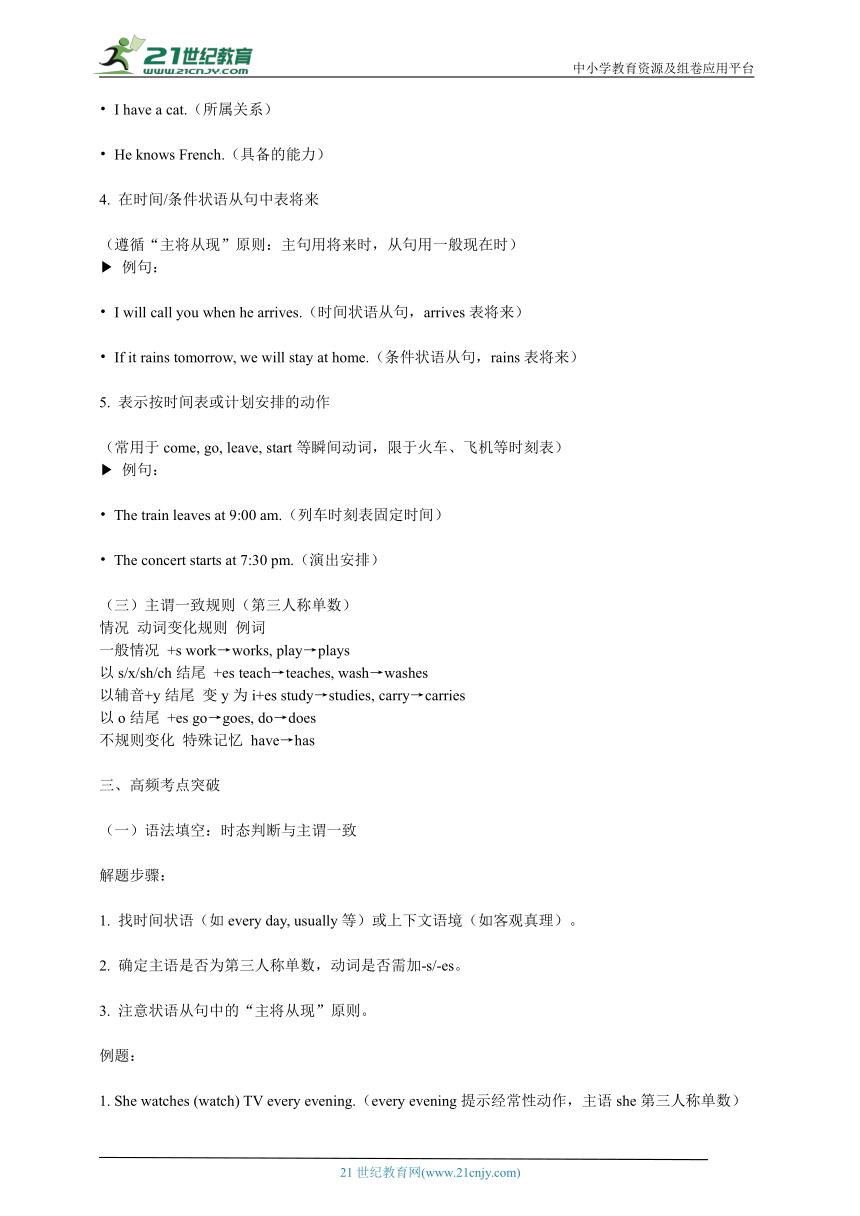高考英语语法复习学案(一般现在时)
图片预览


文档简介
中小学教育资源及组卷应用平台
高考英语一般现在时复习学案
一、复习目标
1. 掌握一般现在时的核心结构及用法(表示经常性动作、客观事实等)。
2. 区分主谓一致规则(尤其是第三人称单数形式)。
3. 突破时间状语辨析、时态对比等高频考点,精准应对各类题型。
二、核心知识梳理
(一)基本结构
句型 结构 例句
肯定句 主语 + 动词原形/第三人称单数形式 I play tennis every week.She studies English daily.
否定句 主语 + don’t/doesn’t + 动词原形 I don’t like coffee.He doesn’t watch TV at night.
一般疑问句 Do/Does + 主语 + 动词原形? Do you go to school by bus Does she live in Beijing
特殊疑问句 特殊疑问词 + do/does + 主语 + 动词原形? What do you do on weekends Where does he work
(二)核心用法
1. 表示经常性、习惯性的动作
(常与频度副词连用:always, usually, often, sometimes, seldom, never, every day/week/month等)
例句:
He plays football twice a week.(每周两次,习惯性动作)
They always arrive early.(总是早到,经常性行为)
2. 表示客观事实、真理或自然现象
例句:
The earth goes around the sun.(客观真理)
Water boils at 100℃.(自然规律)
3. 表示现在的状态或特征
(常用于静态动词:be, have, know, believe等)
例句:
She is a teacher.(现在的职业)
I have a cat.(所属关系)
He knows French.(具备的能力)
4. 在时间/条件状语从句中表将来
(遵循“主将从现”原则:主句用将来时,从句用一般现在时)
例句:
I will call you when he arrives.(时间状语从句,arrives表将来)
If it rains tomorrow, we will stay at home.(条件状语从句,rains表将来)
5. 表示按时间表或计划安排的动作
(常用于come, go, leave, start等瞬间动词,限于火车、飞机等时刻表)
例句:
The train leaves at 9:00 am.(列车时刻表固定时间)
The concert starts at 7:30 pm.(演出安排)
(三)主谓一致规则(第三人称单数)
情况 动词变化规则 例词
一般情况 +s work→works, play→plays
以s/x/sh/ch结尾 +es teach→teaches, wash→washes
以辅音+y结尾 变y为i+es study→studies, carry→carries
以o结尾 +es go→goes, do→does
不规则变化 特殊记忆 have→has
三、高频考点突破
(一)语法填空:时态判断与主谓一致
解题步骤:
1. 找时间状语(如every day, usually等)或上下文语境(如客观真理)。
2. 确定主语是否为第三人称单数,动词是否需加-s/-es。
3. 注意状语从句中的“主将从现”原则。
例题:
1. She watches (watch) TV every evening.(every evening提示经常性动作,主语she第三人称单数)
2. If he finishes (finish) the work, he will go home.(条件状语从句,用一般现在时表将来)
3. The teacher says (say) that the earth is round.(客观真理,主语teacher第三人称单数)
(二)短文改错:时态误用与主谓一致错误
常见错误类型:
1. 第三人称单数漏加-s/-es:
错:He play basketball every day.
对:He plays basketball every day.(主语he第三人称单数)
2. 静态动词误用进行时:
错:I am having a book.
对:I have a book.(have表所属,不用进行时)
3. 状语从句时态错误:
错:I will write to you when I will arrive.
对:I will write to you when I arrive.(时间状语从句用一般现在时表将来)
例题:
错:The sun rises in the east and set in the west.
改:The sun rises in the east and sets in the west.(客观真理,set需用第三人称单数sets)
(三)写作:精准表达与避免中式思维
提升技巧:
1. 用频度副词增强动作的规律性:
原句:I read English.
改:I usually read English every morning.(明确习惯)
2. 区分静态动词与动态动词:
正确:She is beautiful.(静态,用be动词)
正确:She dances beautifully.(动态,用实义动词)
3. 避免“主将从现”结构中的时态冗余:
正确:When my mother comes back, I will cook dinner.(从句一般现在时,主句将来时)
四、巩固练习
(一)单句填空
1. The sun ______ (rise) in the east.
2. They ______ (not like) eating junk food.
3. ______ she ______ (go) to school by bike every day
4. If it ______ (snow), we will make a snowman.
5. My father ______ (have) a new car.
(二)短文改错(每行一处错误)
1. He go to school at 7:30 every morning. __________
2. The library opens at 8 am and close at 6 pm. __________
3. I will call you as soon as he will get here. __________
4. She doesn’t plays the piano on weekends. __________
5. Tom and Lily has a cat named Mimi. __________
(三)写作提升
用一般现在时完成句子:
1. 我每天早上六点起床。
I ____________________ at 6 am every morning.
2. 地球是圆的。
The earth ____________________.
3. 如果天气好,我们就去公园。
We will go to the park if the weather ____________________.
五、参考答案
(一)单句填空
1. rises(客观真理)
2. don’t like(主语they复数,用don’t)
3. Does; go(主语she第三人称单数,用does)
4. snows(条件状语从句,用一般现在时表将来)
5. has(主语father第三人称单数,have→has)
(二)短文改错
1. go→goes(主语he第三人称单数)
2. close→closes(主语library第三人称单数)
3. 去掉第二个will(状语从句用一般现在时表将来)
4. plays→play(doesn’t后接动词原形)
5. has→have(主语Tom and Lily复数)
(三)写作提升
1. get up
2. is round
3. is good
备考小贴士:
1. 制作“第三人称单数动词变化表”,强化不规则变化记忆(如have→has)。
2. 针对“主将从现”句型,整理经典例句(如when/if从句)并仿写。
3. 写作中先确定动作属性(习惯/真理/将来),再选择对应时态,避免混淆。
21世纪教育网 www.21cnjy.com 精品试卷·第 2 页 (共 2 页)
HYPERLINK "http://21世纪教育网(www.21cnjy.com)
" 21世纪教育网(www.21cnjy.com)
高考英语一般现在时复习学案
一、复习目标
1. 掌握一般现在时的核心结构及用法(表示经常性动作、客观事实等)。
2. 区分主谓一致规则(尤其是第三人称单数形式)。
3. 突破时间状语辨析、时态对比等高频考点,精准应对各类题型。
二、核心知识梳理
(一)基本结构
句型 结构 例句
肯定句 主语 + 动词原形/第三人称单数形式 I play tennis every week.She studies English daily.
否定句 主语 + don’t/doesn’t + 动词原形 I don’t like coffee.He doesn’t watch TV at night.
一般疑问句 Do/Does + 主语 + 动词原形? Do you go to school by bus Does she live in Beijing
特殊疑问句 特殊疑问词 + do/does + 主语 + 动词原形? What do you do on weekends Where does he work
(二)核心用法
1. 表示经常性、习惯性的动作
(常与频度副词连用:always, usually, often, sometimes, seldom, never, every day/week/month等)
例句:
He plays football twice a week.(每周两次,习惯性动作)
They always arrive early.(总是早到,经常性行为)
2. 表示客观事实、真理或自然现象
例句:
The earth goes around the sun.(客观真理)
Water boils at 100℃.(自然规律)
3. 表示现在的状态或特征
(常用于静态动词:be, have, know, believe等)
例句:
She is a teacher.(现在的职业)
I have a cat.(所属关系)
He knows French.(具备的能力)
4. 在时间/条件状语从句中表将来
(遵循“主将从现”原则:主句用将来时,从句用一般现在时)
例句:
I will call you when he arrives.(时间状语从句,arrives表将来)
If it rains tomorrow, we will stay at home.(条件状语从句,rains表将来)
5. 表示按时间表或计划安排的动作
(常用于come, go, leave, start等瞬间动词,限于火车、飞机等时刻表)
例句:
The train leaves at 9:00 am.(列车时刻表固定时间)
The concert starts at 7:30 pm.(演出安排)
(三)主谓一致规则(第三人称单数)
情况 动词变化规则 例词
一般情况 +s work→works, play→plays
以s/x/sh/ch结尾 +es teach→teaches, wash→washes
以辅音+y结尾 变y为i+es study→studies, carry→carries
以o结尾 +es go→goes, do→does
不规则变化 特殊记忆 have→has
三、高频考点突破
(一)语法填空:时态判断与主谓一致
解题步骤:
1. 找时间状语(如every day, usually等)或上下文语境(如客观真理)。
2. 确定主语是否为第三人称单数,动词是否需加-s/-es。
3. 注意状语从句中的“主将从现”原则。
例题:
1. She watches (watch) TV every evening.(every evening提示经常性动作,主语she第三人称单数)
2. If he finishes (finish) the work, he will go home.(条件状语从句,用一般现在时表将来)
3. The teacher says (say) that the earth is round.(客观真理,主语teacher第三人称单数)
(二)短文改错:时态误用与主谓一致错误
常见错误类型:
1. 第三人称单数漏加-s/-es:
错:He play basketball every day.
对:He plays basketball every day.(主语he第三人称单数)
2. 静态动词误用进行时:
错:I am having a book.
对:I have a book.(have表所属,不用进行时)
3. 状语从句时态错误:
错:I will write to you when I will arrive.
对:I will write to you when I arrive.(时间状语从句用一般现在时表将来)
例题:
错:The sun rises in the east and set in the west.
改:The sun rises in the east and sets in the west.(客观真理,set需用第三人称单数sets)
(三)写作:精准表达与避免中式思维
提升技巧:
1. 用频度副词增强动作的规律性:
原句:I read English.
改:I usually read English every morning.(明确习惯)
2. 区分静态动词与动态动词:
正确:She is beautiful.(静态,用be动词)
正确:She dances beautifully.(动态,用实义动词)
3. 避免“主将从现”结构中的时态冗余:
正确:When my mother comes back, I will cook dinner.(从句一般现在时,主句将来时)
四、巩固练习
(一)单句填空
1. The sun ______ (rise) in the east.
2. They ______ (not like) eating junk food.
3. ______ she ______ (go) to school by bike every day
4. If it ______ (snow), we will make a snowman.
5. My father ______ (have) a new car.
(二)短文改错(每行一处错误)
1. He go to school at 7:30 every morning. __________
2. The library opens at 8 am and close at 6 pm. __________
3. I will call you as soon as he will get here. __________
4. She doesn’t plays the piano on weekends. __________
5. Tom and Lily has a cat named Mimi. __________
(三)写作提升
用一般现在时完成句子:
1. 我每天早上六点起床。
I ____________________ at 6 am every morning.
2. 地球是圆的。
The earth ____________________.
3. 如果天气好,我们就去公园。
We will go to the park if the weather ____________________.
五、参考答案
(一)单句填空
1. rises(客观真理)
2. don’t like(主语they复数,用don’t)
3. Does; go(主语she第三人称单数,用does)
4. snows(条件状语从句,用一般现在时表将来)
5. has(主语father第三人称单数,have→has)
(二)短文改错
1. go→goes(主语he第三人称单数)
2. close→closes(主语library第三人称单数)
3. 去掉第二个will(状语从句用一般现在时表将来)
4. plays→play(doesn’t后接动词原形)
5. has→have(主语Tom and Lily复数)
(三)写作提升
1. get up
2. is round
3. is good
备考小贴士:
1. 制作“第三人称单数动词变化表”,强化不规则变化记忆(如have→has)。
2. 针对“主将从现”句型,整理经典例句(如when/if从句)并仿写。
3. 写作中先确定动作属性(习惯/真理/将来),再选择对应时态,避免混淆。
21世纪教育网 www.21cnjy.com 精品试卷·第 2 页 (共 2 页)
HYPERLINK "http://21世纪教育网(www.21cnjy.com)
" 21世纪教育网(www.21cnjy.com)
